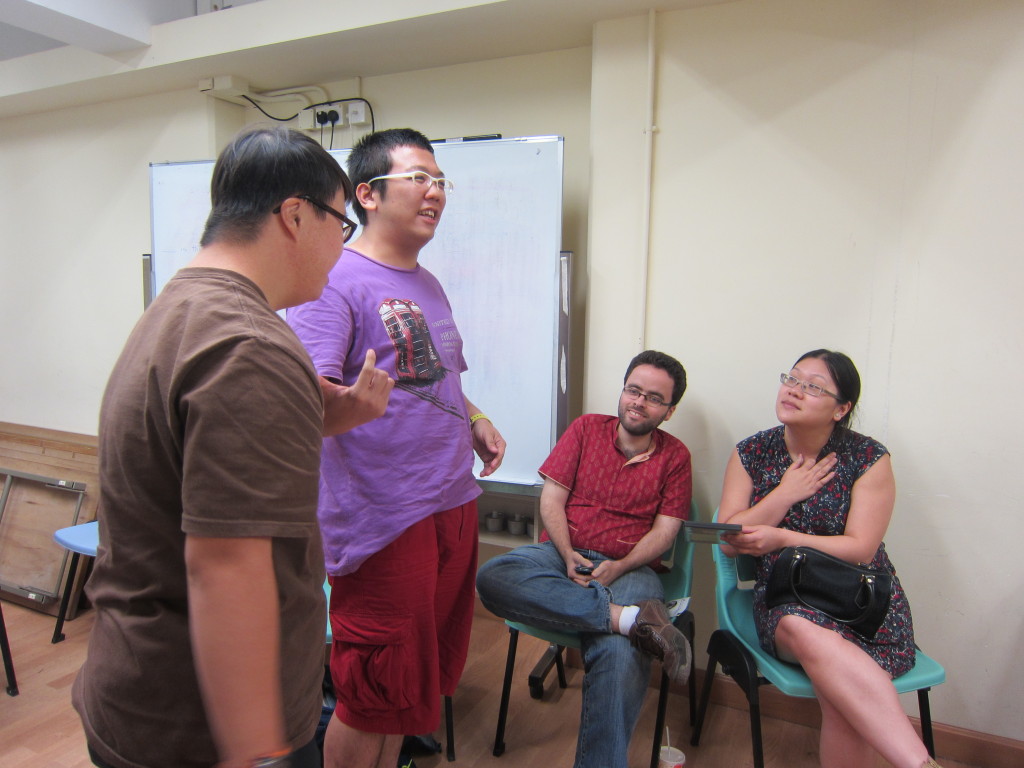There’re special environments you come across in places where disabled people have gotten together. Places that you feel welcome into a community and you see what that community has done for its members. When a friend and I visited Chosen Power in Hong Kong earlier this month I felt this again, reminding me of how much I enjoy spending time with and working with disabled people.
Chosen Power is a self-help organisation for people with different learning abilities in Hong Kong. Founded in 1995 it now has over 100 members with different learning abilities. They run the organisation, conducting activities in both Hong Kong and internationally. It is a place where people with intellectual disabilities have joined together to speak for themselves.

We were welcomed warmly from the beginning, with Chosen Power’s members carefully handing us their business cards. They then presented on how the group formed and its activities since then. Coming out of social activities, the organisation formed to be able to attend international meetings. It is now resolutely not a recreation centre but rather an advocacy organisation using different channels to express their views both at home and abroad.
The welcome with which we were received, foreigners not speaking Cantonese, is partly the way they treat each other and where their strength comes from. The power that they chose is one of people coming together, each having their qualities valued. “We need to work together. I cannot do and maybe you can help. This is the power.” Emily, a supporter (and guardian angel), describes the inclusion they are working for as “you step on my toe and that’s OK” rather than one of trying to make everyone the same.
Chosen Power’s members reflect this diversity and tolerance. Beyond the warm welcome all expressed, the members have very different communication styles. Some of them can happily talk about organisations and UN Conventions; others are keen to talk about what they had for lunch, or the work they do cleaning trays at a fast-food restaurant.
The changes they have made and what they mean in their member’s lives remind me of the stories I’ve heard from groups in Bangladesh. Even though the Bangladeshi groups I know are centred largely around people with physical disabilities, the stories are similar. People go from thinking they couldn’t do things and perhaps not even having a voice in their own families to taking part in and leading activities with peers, officials and all sorts of other people.
Kit, the Secretary of the group, told us afterwards how amazed he was to see the members of Chosen Power before he’d joined. He’d never seen anyone like them being able to conduct workshops or, say, teach tai chi. At first he didn’t believe he could be like that also, but after persuasion, slowly accepting himself and growing confidence he has now conducted dramas as well as been part of a delegation that went to Geneva. “You’re so confident now” my friend said when Kit was telling his story. “I’ve changed,” Kit replied.
Another similarity to the groups in Bangladesh is that they don’t seem to have described this role that the organisation can play in transforming its members lives. This to me is much more than advocacy or accessing “rights”. It is about peers changing what you think you can do, and you having a platform from which to do it.
Not only have Chosen Power members as individuals been able to achieve things, they as a group have been able to reposition themselves. “Parents” are constantly referred to, and they were joking about someone’s parents being like the Party on the Chinese Mainland. “I love you so want to put you in a safety jar” is how Emily describes parents’ attitudes to children with intellectual disabilities. As an organization they have found a place – perhaps the only one? – where they themselves are in charge, where they can take decisions. In the organisation, we are up here, one member gestures above with his hands, parents are down there, gesturing below. At home, it’s the other way around.
This organisation has given people a chance to do things and speak for themselves. When they described their foreign trips it seemed almost as important that they’d raised the money and gone and taken the bus and stayed at someone’s house as it did that they’d spoken at a conference. The diversity within the group itself also shows different ways of participating and valuing experiences. Not everyone gets the same thing out of the journey, but they are all travelling to places they could not go to before. “If you do not step forward then no-one can help you. If you do not want to be trapped then you need to stand up.”
You can read a bit more in English on Chosen Power’s Message via the International Disability Alliance. A special thanks to Emily and all those at Chosen Power for sharing some of their world.